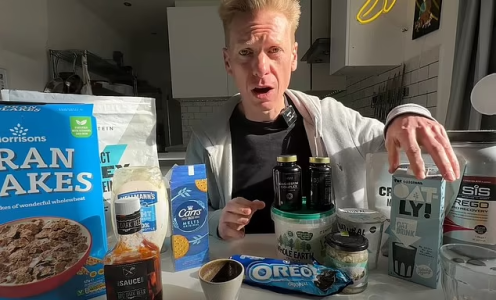This Family Stopped Eating Ultra-Processed Foods for a Month, and the Effects on Their Energy, Hunger, and Mental Health Are Astonishing
By
Gian T
- Replies 33
In a world where convenience often trumps quality, ultra-processed foods (UPFs) have become a staple in many diets. These foods, which are typically high in sugar, fat, and salt, have been linked to a range of health issues, from obesity to heart disease. But what happens when a family decides to cut them out completely? We've got an exclusive insider story that reveals the astonishing effects on energy levels, hunger, and mental health after ditching UPFs for a month.
The journey to a UPF-free diet is not for the faint-hearted. It requires a significant shift in eating habits and a new approach to grocery shopping and meal preparation. For our featured family, the challenge was to replace their usual diet of convenient, packaged foods with whole foods that generally contain only one or two ingredients.
Gavin Wren, a 46-year-old food policy expert from London, and Jon Kuhn, a 38-year-old father-of-two from Indiana, embarked on this dietary experiment with the hope of reaping health benefits. They both shared their experiences with us, and their stories are a testament to the profound impact diet can have on our well-being.
Wren, who had to give up favourites like Oreos and oat milk, found the experiment to be a source of anxiety. The stress of meticulously checking ingredient lists and the increased cost of whole foods made social events and grocery shopping a daunting task. His takeaway? Moderation is key. While he recognised the importance of reducing UPFs, he also acknowledged that an extreme diet devoid of all UPFs is not practical in today's society.
Kuhn, on the other hand, experienced intense irritability and agitation reminiscent of nicotine withdrawal during the initial phase of his UPF-free diet. This reaction was likely due to sugar withdrawal, as high-sugar diets can lead to overeating and addiction-like symptoms. Despite the rocky start, Kuhn noticed a significant improvement in his irritable bowel syndrome (IBS), a condition that may be exacerbated by the disruption of gut microbes caused by UPFs.
Throughout the 30-day period, both men faced challenges in maintaining a strict UPF-free diet, especially in social settings. Wren's slip-ups included indulging in chilli sauce, pub crawl snacks, and ice cream, while Kuhn reintroduced vegan alternative UPFs like vegan meats into his diet post-experiment.
Despite the difficulties, there were undeniable health benefits. Both men reported more stable energy levels and mood throughout the day. Kuhn's IBS relief was a particularly noteworthy improvement. However, they also recognised the convenience and enjoyment that some UPFs brought to their lives, especially in social contexts.
The experiment highlighted the importance of balance. While whole foods are undeniably healthier, UPFs can make life easier and more enjoyable. The key is to find a happy medium where whole foods form the foundation of the diet, with UPFs enjoyed in moderation.
Our readers, especially those in their golden years, might find this story particularly relevant. As we age, our bodies become more sensitive to dietary choices, and the impact of UPFs can be more pronounced. This family's experience serves as a powerful reminder of the benefits of eating whole foods and the potential drawbacks of a diet high in UPFs.
Credit: YouTube

We invite you to share your own experiences with UPFs and whole foods. Have you noticed changes in your energy, hunger, or mental health after altering your diet? Join the conversation below and let us know how your dietary choices have affected your well-being.
The journey to a UPF-free diet is not for the faint-hearted. It requires a significant shift in eating habits and a new approach to grocery shopping and meal preparation. For our featured family, the challenge was to replace their usual diet of convenient, packaged foods with whole foods that generally contain only one or two ingredients.
Gavin Wren, a 46-year-old food policy expert from London, and Jon Kuhn, a 38-year-old father-of-two from Indiana, embarked on this dietary experiment with the hope of reaping health benefits. They both shared their experiences with us, and their stories are a testament to the profound impact diet can have on our well-being.
Wren, who had to give up favourites like Oreos and oat milk, found the experiment to be a source of anxiety. The stress of meticulously checking ingredient lists and the increased cost of whole foods made social events and grocery shopping a daunting task. His takeaway? Moderation is key. While he recognised the importance of reducing UPFs, he also acknowledged that an extreme diet devoid of all UPFs is not practical in today's society.
Kuhn, on the other hand, experienced intense irritability and agitation reminiscent of nicotine withdrawal during the initial phase of his UPF-free diet. This reaction was likely due to sugar withdrawal, as high-sugar diets can lead to overeating and addiction-like symptoms. Despite the rocky start, Kuhn noticed a significant improvement in his irritable bowel syndrome (IBS), a condition that may be exacerbated by the disruption of gut microbes caused by UPFs.
Throughout the 30-day period, both men faced challenges in maintaining a strict UPF-free diet, especially in social settings. Wren's slip-ups included indulging in chilli sauce, pub crawl snacks, and ice cream, while Kuhn reintroduced vegan alternative UPFs like vegan meats into his diet post-experiment.
Despite the difficulties, there were undeniable health benefits. Both men reported more stable energy levels and mood throughout the day. Kuhn's IBS relief was a particularly noteworthy improvement. However, they also recognised the convenience and enjoyment that some UPFs brought to their lives, especially in social contexts.
The experiment highlighted the importance of balance. While whole foods are undeniably healthier, UPFs can make life easier and more enjoyable. The key is to find a happy medium where whole foods form the foundation of the diet, with UPFs enjoyed in moderation.
Our readers, especially those in their golden years, might find this story particularly relevant. As we age, our bodies become more sensitive to dietary choices, and the impact of UPFs can be more pronounced. This family's experience serves as a powerful reminder of the benefits of eating whole foods and the potential drawbacks of a diet high in UPFs.
Credit: YouTube
Key Takeaways
- Two individuals reported negative experiences after quitting ultra-processed foods (UPFs) for 30 days, highlighting challenges with anxiety, hunger, and social constraints.
- Despite initial difficulties, one participant experienced health benefits, such as an improvement in symptoms of irritable bowel syndrome (IBS).
- The experiment underscored the difficulty of avoiding UPFs in social settings and maintaining a balanced lifestyle while adhering to a restrictive diet.
- The participants' advice was to consume UPFs in moderation rather than eliminating them entirely, as they recognised the practical limitations and potential stress caused by striving for a zero UPF diet.








